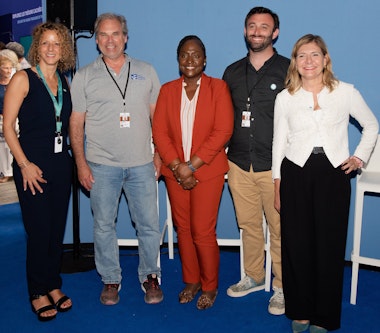Country or Region selection
Worldwide MSC International
Europe
From Bridge to Reef: Partnerships Supporting Ocean Stewardship from Ships to Shorelines
12/06/2025- UN Ocean Conference spotlight: MSC Foundation explores how maritime education and tourism-linked coral restoration can scale ocean stewardship in step with the conference theme of “Accelerating action and mobilising all actors to conserve and sustainably use the ocean”.
- Interactive sessions involving eight speakers at the UNOC-3 ICRI #ForCoral Pavilion show how cross-sector partnerships are shaping a new model for resilient reefs and informed ocean leadership.
Yesterday, at the UN Ocean Conference 2025 in Nice, the MSC Foundation hosted two interactive sessions in the ICRI #ForCoral Pavilion, featuring eight speakers who highlighted the greater benefits for marine conservation that can be achieved when private and public sector actors combine their strengths across sectors and areas of expertise.
A common thread throughout was the Super Coral Reefs Programme at Ocean Cay in The Bahamas, a cruise tourism destination now home to a purpose-built Marine Conservation Center. Operated by the MSC Foundation, the Center integrates coral restoration, science, firsthand training for university students, and guided interactive learning for island visitors.
“Our coral reefs need bold, forward-looking initiatives that reflect the realities of a changing climate,” said Professor David Smith, Chief Scientific Adviser to the MSC Foundation. “The Bahamas—rich in coral heritage—holds both a deep connection to its reefs and a unique opportunity to lead. With its remarkable natural assets, expanding educational infrastructure, and strong local expertise, the country is well placed to advance climate-resilient reef stewardship.”
Dr Raveenia Roberts-Hanna, President of the Bahamas Agriculture and Marine Science Institute (BAMSI) added: “Our students in marine science and nature-based tourism working with the MSC Foundation at Ocean Cay this summer will be gaining knowledge and exposure to the real-world challenges and solutions shaping coral conservation. Through this partnership, we will be helping them develop new skill sets—from reef monitoring to sustainable tourism interpretation—that are essential for future careers in eco-tourism and blue economy sectors.”
Speakers, including Capt. Henri Lefering (MSC Cruises) Professor Ronán Long (WMU), Raffaella Giugni (Marevivo), Dr. Tessa Hempson (Mission Blue) and Maeve Nightingale (IUCN), emphasised the vital role of ocean literacy in preparing current and future maritime professionals to lead on sustainability, stressing that aligning education, maritime leadership, science and biodiversity goals is essential to scaling ocean action across sectors.
Examples cited include a marine education programme by Marevivo that is engaging over 1000 students at over 15 nautical institutes each year across Italy, Spain, Greece, and Portugal, and customised training offered at the Sasakawa Global Ocean Institute of the World Maritime University to mid-level professionals in ocean governance, bridging policy and maritime practice.
Speakers David Smith (MARS, MSC Foundation) and Victor Galvàn (Iberostar) emphasised that when paired with tourism-linked restoration efforts, these partnerships offer long-term value for sustainability, reef health, and community development.
“We organised these panels to explore how private sector actors—notably those in shipping and tourism—are contributing meaningfully to marine conservation and ocean literacy. At the MSC Foundation, we see our role not only as a funder, but as a bridge between restoration, science, education, and public engagement”, said Daniela Picco, Executive Director of the MSC Foundation. “The exchanges between these diverse partners today will help us take lessons forward to better inspire ocean stewardship across regions, communities and on board ships.”
Tom Dallison, Strategic Advisor, International Coral Reef Initiative (ICRI), added "The #ForCoral Pavilion is a vital space at the Third UN Ocean Conference—where science, policy, finance and people come together to accelerate collective action for coral reefs. From restoration, tourism and coral reef monitoring, to innovative financing and ocean literacy, the Pavilion has demonstrated that solutions to the coral reef crisis exist, and now we need the resolve, ambition, and our combined efforts, to safeguard coral reefs, and all those that depend on them.”
ABOUT the UN Ocean Conference and MSC Foundation Sessions
The United Nations Ocean Conference 2025, held in Nice, France, gathered global leaders around the theme “Accelerating action and mobilising all actors to conserve and sustainably use the ocean” to progress on Sustainable Development Goal 14: Life Below Water.
Held in the Green Zone space reserved for dialogue between civil society, academia, industry, and youth, the two interactive sessions, moderated by MSC Foundation Advisory Board Member Carl Gustaf Lundin, aligned with the Conference’s theme and aims related to advancing science-based solutions and building capacity in Small Island Developing States. Eight speakers explored how industry-aligned conservation programmes can deliver both environmental and community benefits.
- Ocean Stewardship from the Helm
- Dr Tessa Hempson, Mission Blue, Chief Scientist
- Ronán Long, WMU–Sasakawa Global Ocean Institute, Director
- Ms Raffaella Giugni, Marevivo, Secretary General
- Henri Lefering, MSC Cruises, Vice President Crew Experience, Learning, Development and Talent Management
- Coral Restoration through Tourism and Business
- Ms Maeve Nightingale, IUCN Asia, Regional Coordinator
- Dr Tessa Hempson, Mission Blue, Chief Scientist
- Prof David Smith, MARS, Chief Marine Scientist
- Dr Raveenia Roberts-Hanna, BAMSI, President
- Mr Victor Galvàn, Iberostar, Head of Nature-Based Solutions (TBC)
ABOUT MSC FOUNDATION
Headquartered in Geneva, Switzerland, the MSC Foundation is the philanthropic arm of the MSC Group. Established in 2018, the Foundation supports initiatives in environmental conservation, community support, education, and emergency relief. Its mission is to use MSC’s global reach and knowledge of the sea to take action that contributes to protecting and nurturing the blue planet and its people.
